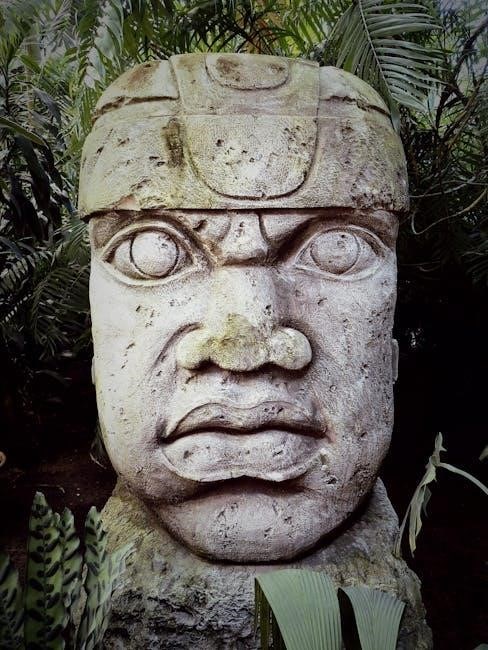The Twelve Tribes of Israel‚ originating from Jacob’s sons‚ formed the foundation of the nation. Each tribe’s name carries deep linguistic and symbolic meaning‚ reflecting their character and destiny.
Historical Background of the Twelve Tribes
The Twelve Tribes of Israel trace their origins to Jacob‚ whose twelve sons became the patriarchs of the tribes. Each tribe’s name reflects its unique identity and destiny. The tribes played a central role in the Exodus‚ with Moses leading them out of Egypt. Upon entering the Promised Land‚ the tribes were allocated specific territories‚ shaping their historical and cultural development. The united monarchy under King David and Solomon marked a golden era‚ while the divided monarchy led to the kingdoms of Israel and Judah. The tribes’ history is intertwined with covenant‚ faith‚ and divine promise‚ forming the backbone of Israel’s national identity. Their legacy endures in Jewish and Christian traditions‚ symbolizing unity and divine purpose.
Significance of the Twelve Tribes in Biblical Context
The Twelve Tribes of Israel hold profound significance in the biblical narrative‚ representing God’s covenant with Abraham and the formation of His chosen people. Each tribe symbolized a unique aspect of God’s plan‚ with their names often reflecting divine promises or prophetic meanings. The tribes were organized into a structured society‚ with roles in worship‚ governance‚ and warfare. They were central to Israel’s identity‚ embodying unity and diversity under God’s leadership. The tribes’ history‚ from the Exodus to the Promised Land‚ illustrates themes of faith‚ obedience‚ and redemption. Their legacy extends into the New Testament‚ where they symbolize the universal church‚ with Jesus as the ultimate descendant of Judah. The Twelve Tribes remain a powerful symbol of God’s faithfulness and the unity of His people across generations.

The Names of the Twelve Tribes
The Twelve Tribes of Israel‚ descended from Jacob‚ are Reuben‚ Simeon‚ Levi‚ Judah‚ Dan‚ Naphtali‚ Gad‚ Asher‚ Issachar‚ Zebulun‚ Joseph‚ and Benjamin‚ each with unique meanings reflecting their heritage.
Reuben (רְאוּבֵן)
Reuben‚ the firstborn of Jacob and Leah‚ holds a significant place among the Twelve Tribes. His name‚ meaning “Behold‚ a son” in Hebrew‚ reflects Leah’s joy at his birth. Despite being the eldest‚ Reuben lost his birthright due to his actions with Bilhah‚ Jacob’s concubine. The tribe of Reuben was known for its strategic placement in the Promised Land‚ east of the Jordan River. They were part of the group that initially failed to drive out the inhabitants but later proved loyal during critical moments in Israel’s history. Reuben’s story symbolizes both the privileges and responsibilities of leadership‚ as well as the consequences of impulsive decisions. His legacy remains a reminder of the complexities of human nature and divine grace.
Simeon (שִׁמְעוֹן)
Simeon‚ the second son of Jacob and Leah‚ derives his name from the Hebrew word for “hearing” or “listening‚” reflecting Leah’s prayer for recognition. Simeon’s tribe was known for its close bond with Levi‚ as the two often acted together. Notably‚ Simeon and Levi led the retaliation against the city of Shechem for the dishonor of their sister Dinah‚ showcasing their fierce loyalty but also their impulsive nature. The tribe of Simeon was later allocated land within Judah’s territory‚ and over time‚ they became integrated into the larger tribe of Judah. Simeon’s legacy is marked by both strength and a tendency toward violence‚ ultimately blending into the broader identity of the people of Israel. Their story highlights the complexities of tribal unity and the challenges of balancing justice with compassion.
Levi (לֵוִי)
Levi‚ the third son of Jacob and Leah‚ is derived from the Hebrew word for “joining” or “attachment‚” reflecting Leah’s hope that Jacob would finally join with her. The tribe of Levi played a unique role in Israel’s history‚ as they were set apart by God to serve as priests and spiritual leaders. After the incident of the golden calf‚ the Levites demonstrated their loyalty to God‚ solidifying their role as mediators between God and the people. They were responsible for the Tabernacle and later the Temple‚ handling sacred objects and performing sacrifices. Unlike other tribes‚ Levi did not receive a specific territory but was scattered among the tribes to ensure their presence throughout the nation. Their legacy endures in Judaism and Christianity‚ symbolizing spiritual service and devotion. The Levites’ role in preserving the Torah and educating the people further highlights their cultural and historical significance.
Judah (יְהוּדָה)
Judah‚ the fourth son of Jacob and Leah‚ derives his name from the Hebrew word for “praise” or “thanksgiving.” Leah named him in gratitude to God for granting her another child. The tribe of Judah became the most prominent of the Twelve Tribes‚ producing key figures like King David and Jesus Christ. Judah’s name symbolizes praise and thanksgiving‚ reflecting Leah’s joy and trust in God. The tribe’s leadership role was evident when Judah led the other tribes during their journeys and in battle. The Lion of Judah‚ a symbol associated with the tribe‚ represents strength‚ courage‚ and divine kingship. Judah’s legacy extends beyond the biblical era‚ as the term “Jew” originates from the name Judah‚ linking the tribe to the modern Jewish identity. The tribe’s enduring significance is rooted in its historical‚ cultural‚ and spiritual contributions to the Israelites and beyond.
Dan (דָּן)
Dan‚ the fifth son of Jacob‚ was born to Bilhah‚ Rachel’s handmaid. His name‚ meaning “judge” or “he has judged‚” reflects Rachel’s joy at finally having a child. The tribe of Dan was known for its strength and military prowess‚ often leading the Israelites in battle. Dan’s descendants settled in the northern part of the Promised Land‚ near the Philistines‚ and were skilled in craftsmanship and trade. The name Dan symbolizes fairness and justice‚ as it reflects Rachel’s prayer for a child. The tribe’s history includes both triumphs and challenges‚ such as their role in the conquest of Laish. Dan’s legacy is also tied to the prophetic imagery of the Lion of Judah‚ symbolizing strength and divine authority. The tribe’s contributions to Israel’s identity and culture remain significant in biblical history and tradition.
Naphtali (נַפְתָּלִי)
Naphtali‚ the sixth son of Jacob‚ was born to Bilhah‚ Rachel’s handmaid. His name‚ meaning “struggle” or “wrestling‚” reflects Rachel’s prayer for a child. The tribe of Naphtali was known for its swiftness and agility‚ often likened to a deer in biblical texts. They were part of the northern kingdom of Israel and played a significant role in the nation’s early history. Naphtali’s descendants settled in a fertile region near the Sea of Galilee‚ making them prosperous and influential. The name Naphtali symbolizes perseverance and divine favor‚ as it reflects Rachel’s longing and God’s response. The tribe’s legacy is marked by their contributions to Israel’s military and cultural life‚ as well as their strategic location in the Promised Land. Naphtali’s story highlights themes of hope and resilience in the face of adversity.
Gad (גָּד)
Gad‚ the seventh son of Jacob‚ was born to Zilpah‚ Leah’s handmaid. His name‚ meaning “good fortune” or “luck‚” reflects Leah’s joy at his birth. The tribe of Gad was known for its military strength and strategic settlements east of the Jordan River. Gad’s descendants were skilled warriors‚ contributing significantly to Israel’s early battles. Their territory‚ fertile and suitable for livestock‚ became a symbol of divine provision. The name Gad also carries a sense of resilience‚ as the tribe faced challenges yet remained steadfast. In biblical prophecy‚ Gad is often associated with future restoration‚ emphasizing its enduring legacy; The tribe’s history highlights themes of faith‚ strength‚ and the fulfillment of God’s promises‚ making Gad a significant part of Israel’s identity and heritage.

Asher (אָשֵׁר)

Asher‚ the eighth son of Jacob‚ was born to Zilpah‚ Leah’s handmaid. His name‚ meaning “happy” or “blessed‚” reflects Leah’s gratitude for his birth. The tribe of Asher was known for its prosperity and fertile land in the northern region of Canaan. Asher’s descendants were renowned for their agricultural abundance‚ particularly olive oil and wheat‚ which symbolized divine blessing. The tribe played a significant role in Israel’s early history‚ contributing to the nation’s wealth and stability. Asher’s name also carries a sense of joy and contentment‚ reflecting the tribe’s fortunate circumstances. In biblical prophecy‚ Asher is often associated with future restoration and blessings‚ emphasizing its enduring legacy. The tribe’s story highlights themes of gratitude‚ abundance‚ and the fulfillment of God’s promises‚ making Asher a cherished part of Israel’s heritage.

Issachar (יִשָּׁשכָר)
Issachar‚ the ninth son of Jacob‚ was born to Leah‚ who named him in hope of earning her husband’s love. His name means “God has given me my hire” or “reward.” The tribe of Issachar was known for its wisdom and strong work ethic‚ often engaging in agriculture and trade. Issachar’s descendants were among the most prosperous tribes‚ contributing significantly to Israel’s economy. Their strategic location in the fertile Jezreel Valley made them vital to the nation’s growth. In biblical history‚ Issachar played a key role in the Exodus and the conquest of Canaan. The tribe’s legacy is one of diligence and faith‚ symbolizing the rewards of hard work and trust in God; Their story reflects the balance between spiritual devotion and practical labor‚ making Issachar a unique and important part of Israel’s heritage.
Zebulun (זְבוּלוּן)
Zebulun‚ the tenth son of Jacob‚ was born to Leah‚ who named him in celebration of her husband’s affection. The name Zebulun means “exalted” or “gift‚” symbolizing her joy and hope for a closer relationship with Jacob. The tribe of Zebulun was known for its seafaring skills and strategic location near the Mediterranean coast‚ making them prominent in trade and commerce. Zebulun’s descendants were part of the northern kingdom of Israel and played a role in the nation’s economic prosperity. In biblical history‚ Zebulun contributed to the Exodus and the conquest of Canaan‚ demonstrating their strength and resilience. The tribe’s legacy is one of adaptability and resourcefulness‚ reflecting their ability to thrive in diverse environments. Zebulun’s story highlights the importance of practical skills and economic contribution to the broader community of Israel.
Joseph (יוֹסֵף)
Joseph‚ the eleventh son of Jacob‚ was born to Rachel‚ who named him in her sorrow‚ hoping for more children. His name means “He will add” or “May God add another son.” Joseph’s life was marked by divine favor and resilience. Despite being sold into slavery by his brothers‚ he rose to prominence in Egypt‚ becoming a trusted advisor to Pharaoh. His ability to interpret dreams and manage resources during the famine showcased his wisdom and leadership. The tribe of Joseph‚ which later split into Ephraim and Manasseh‚ became a significant part of Israel’s identity. Joseph’s story symbolizes overcoming adversity and divine providence. His legacy emphasizes faith‚ forgiveness‚ and the power of God’s plan. The name Joseph reflects themes of addition‚ increase‚ and redemption‚ making him a central figure in Israel’s history and spiritual narrative.

Benjamin (בִּנְיָמִין)
Benjamin‚ the youngest son of Jacob and Rachel‚ was named “son of the right hand” (בִּנְיָמִין)‚ symbolizing strength and favored status. His birth marked Rachel’s final moments‚ as she died soon after. Benjamin’s tribe became significant in Israel’s history‚ producing notable figures like King Saul and the Apostle Paul. The name reflects themes of divine favor and resilience. Benjamin’s story highlights the importance of family bonds and the enduring legacy of Jacob’s sons. His tribe’s history is intertwined with the broader narrative of Israel‚ emphasizing faith and leadership. The name Benjamin remains a powerful symbol of hope and divine providence‚ resonating deeply in both Jewish and Christian traditions. His legacy underscores the enduring significance of the Twelve Tribes in shaping the spiritual and cultural identity of Israel.
The Meanings of the Tribal Names
The names of the Twelve Tribes of Israel hold profound linguistic and cultural significance‚ often reflecting their ancestors’ experiences‚ divine purpose‚ or prophetic destiny. Each name‚ rooted in Hebrew‚ carries symbolic meaning‚ offering insights into their character and role in biblical history.
Linguistic and Cultural Significance
The names of the Twelve Tribes of Israel are deeply rooted in Hebrew‚ reflecting their cultural and historical context. Many names derive from words or phrases tied to their ancestors’ experiences‚ divine interactions‚ or prophetic meanings. For instance‚ “Reuben” (רְאוּבֵן) means “Behold‚ a son‚” symbolizing Jacob’s joy at his birth. Similarly‚ “Judah” (יְהוּדָה) signifies “praise‚” embodying the tribe’s role as a leader in worship and kingship. These names not only identify but also encapsulate the tribes’ identities and destinies‚ making them integral to Israel’s collective memory. Their linguistic structure highlights the richness of Hebrew‚ while their cultural significance underscores their enduring relevance in Jewish tradition and biblical narrative.
Biblical Interpretations of the Names
The names of the Twelve Tribes of Israel hold profound biblical significance‚ often reflecting divine purpose or prophetic meaning. Many names‚ such as “Judah” (praise) and “Reuben” (behold‚ a son)‚ are tied to specific events or emotions expressed by their parents. These names were not merely identifiers but carried spiritual weight‚ often symbolizing their roles in Israel’s history. For instance‚ “Levi” signifies “joining‚” highlighting the tribe’s priestly role‚ while “Joseph” means “God will add‚” foreshadowing his prosperity. Biblical interpretations emphasize that these names were divinely ordained‚ shaping the tribes’ identities and destinies. They serve as reminders of God’s covenant with Israel and the unique purpose of each tribe in His plan.
Symbolism in the Names
The names of the Twelve Tribes of Israel are rich in symbolism‚ often reflecting divine purpose‚ family dynamics‚ or prophetic destiny. For instance‚ “Judah” (praise) symbolizes the tribe’s role as leaders and recipients of divine favor. “Reuben” (behold‚ a son) represents sight and hope‚ while “Levi” (joining) signifies the tribe’s priestly role in uniting God and His people. “Joseph” (God will add) embodies prosperity and divine blessing. These names are not merely labels but carry deeper spiritual meanings‚ often tied to their ancestors’ experiences or prophetic visions. The symbolism underscores the tribes’ unique roles in Israel’s history and their collective identity as God’s chosen people. Each name serves as a reminder of their covenantal relationship with God and their shared destiny.

The Tribes in Biblical History
The Twelve Tribes played pivotal roles in the Exodus‚ wilderness journeys‚ and the conquest of Canaan‚ shaping Israel’s identity and divine covenant through their collective and individual experiences.
The Role of the Tribes in the Exodus

The Twelve Tribes played a central role in the Exodus‚ as they were organized by Moses into a structured community. Each tribe had specific responsibilities‚ contributing to the collective survival and journey. Their names often reflected their roles and destinies‚ symbolizing their unity under God’s covenant. The tribes camped around the Tabernacle‚ maintaining order and spiritual focus. Their participation in the Exodus highlighted their importance as a cohesive nation‚ bound by faith and purpose. This period solidified their identity and prepared them for the Promised Land‚ emphasizing their divine mission and communal strength.
The Division of the Promised Land
The division of the Promised Land among the Twelve Tribes was a pivotal moment in their history. After the Exodus‚ Joshua led the tribes into Canaan‚ where the land was allocated according to divine instruction. Each tribe received a specific territory‚ ensuring equitable distribution and strategic placement for defense. The names of the tribes often reflected their roles or destinies‚ influencing their settlements. For example‚ Judah‚ meaning “praise‚” was given a prominent region‚ while Levi‚ though without land‚ received cities for their priestly duties. This division symbolized God’s covenant promise and established the tribes as a unified nation. The allocation also highlighted their interconnectedness‚ reinforcing their identity as a people chosen by God to inhabit the land.

The United Kingdom and the Divided Monarchy

The period of the United Kingdom under King Saul‚ David‚ and Solomon marked a golden age for the Twelve Tribes of Israel. During this time‚ the tribes functioned as a unified nation‚ with a centralized government and religious system. However‚ after Solomon’s reign‚ the kingdom divided into two: the northern Kingdom of Israel‚ comprising ten tribes‚ and the southern Kingdom of Judah‚ consisting of two tribes. This division was fueled by political tensions and religious deviations. The names of the tribes often reflected their roles during this era. For instance‚ Judah‚ meaning “praise‚” became the dominant tribe in the south‚ while the northern tribes‚ such as Ephraim and Manasseh‚ descended from Joseph‚ played significant roles in the divided monarchy. This period highlights the complex interplay of tribal identities and political dynamics in ancient Israel.
The Tribes in Modern Context
The Twelve Tribes inspire cultural identity and symbolism today‚ influencing art‚ literature‚ and community structures. Their legacy endures‚ connecting modern societies to ancient traditions and values.
The Legacy of the Twelve Tribes in Judaism
The Twelve Tribes of Israel hold a central place in Jewish identity‚ symbolizing unity and divine covenant. Their names‚ often invoked in blessings and prayers‚ reflect their ancestral roles and spiritual significance. The tribes are commemorated in synagogue rituals‚ such as the display of their names on the Twelve Tribes’ banners. In Jewish tradition‚ the tribes represent the ideal of a unified nation‚ embodying the promise of redemption. Their legacy is celebrated in art‚ literature‚ and education‚ ensuring their memory endures across generations. The study of their meanings deepens understanding of Jewish heritage‚ connecting modern Jews to their ancient roots and fostering a sense of shared history and purpose.
The Twelve Tribes in Christian Theology
In Christian theology‚ the Twelve Tribes of Israel symbolize the universal church and the fulfillment of God’s covenant. Jesus‚ as the “Lion of Judah‚” is seen as the ultimate leader‚ uniting all tribes under His reign. The tribes are often linked to the twelve apostles‚ representing a new spiritual Israel. This imagery emphasizes unity and the inclusion of Gentiles in God’s plan. The Book of Revelation mentions the Twelve Tribes in the context of the heavenly Jerusalem‚ highlighting their enduring significance. Christian traditions often draw parallels between the tribes’ names and spiritual gifts‚ reinforcing their symbolic role in the faith. The legacy of the Twelve Tribes serves as a reminder of God’s faithfulness and the ultimate restoration of His people.
Cultural and Historical Preservation
The Twelve Tribes of Israel hold a profound place in cultural and historical preservation‚ particularly within Jewish tradition. Their names and meanings are meticulously passed down through generations‚ serving as a cornerstone of identity. In many synagogues‚ the tribes’ names are inscribed on scrolls or displayed as symbols of heritage. Educational programs often emphasize the tribes’ history to instill a sense of continuity and pride. Cultural practices‚ such as naming children after the tribes‚ further ensure their legacy endures. The tribes’ stories are also celebrated in art‚ literature‚ and music‚ keeping their memory vibrant. This preservation not only honors the past but also shapes the cultural identity of future generations‚ ensuring the Twelve Tribes remain a vital part of Jewish heritage and global history.
The Twelve Tribes of Israel‚ with their meaningful names‚ remain a cornerstone of biblical and cultural heritage‚ shaping identity and inspiring generations through their enduring legacy and profound significance.
The Twelve Tribes of Israel‚ descended from Jacob‚ are central to biblical history and identity. Each tribe’s name‚ rooted in Hebrew‚ carries unique meanings tied to their origins‚ roles‚ and destinies. Reuben‚ Simeon‚ Levi‚ Judah‚ Dan‚ Naphtali‚ Gad‚ Asher‚ Issachar‚ Zebulun‚ Joseph‚ and Benjamin each symbolize divine providence and cultural heritage. Their names reflect patriarchal blessings‚ familial dynamics‚ and prophetic significance. The tribes played pivotal roles in the Exodus‚ the conquest of Canaan‚ and the formation of the Israelite kingdom. Their legacy endures in Judaism and Christianity‚ symbolizing unity‚ diversity‚ and God’s covenant promises. Understanding their names and meanings enriches biblical interpretation and cultural appreciation‚ highlighting their enduring impact on faith and history.
The Enduring Significance of the Twelve Tribes
The Twelve Tribes of Israel hold profound significance in biblical and cultural contexts‚ symbolizing unity‚ diversity‚ and divine covenant. Their names‚ deeply rooted in Hebrew‚ reflect patriarchal blessings‚ familial dynamics‚ and prophetic destiny. Beyond their historical roles in the Exodus and the conquest of Canaan‚ the tribes embody enduring spiritual and cultural identity. In Judaism‚ they represent the foundation of the nation‚ while in Christianity‚ they symbolize the universal church. The tribes’ legacy persists in traditions‚ such as the menorah’s twelve tribes representation‚ and in modern identity‚ fostering unity among dispersed communities. Their stories and meanings continue to inspire faith‚ resilience‚ and a connection to ancestral heritage‚ ensuring their relevance across generations and cultures.


